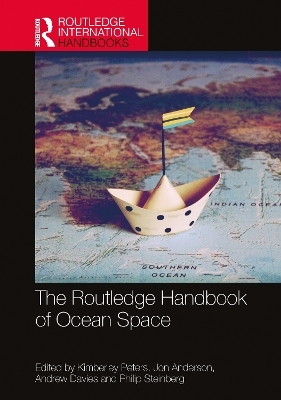
The Routledge Handbook of Ocean Space
Routledge (Verlag)
978-1-138-08480-3 (ISBN)
Through six clearly structured and wide-ranging sections, The Routledge Handbook of Ocean Space examines and interrogates how the oceans are environmental, historical, social, cultural, political, legal and economic spaces, and also zones where national and international security comes into question. With a foreword and introduction authored by some of the leading scholars researching and writing about ocean spaces, alongside 31 further, carefully crafted chapters from established as well as early career academics, this book provides both an accessible guide to the subject and a cutting-edge collection of critical ideas and questions shaping the social sciences today.
This handbook brings together the key debates defining the ‘field’ in one volume, appealing to a wide, cross-disciplinary social science and humanities audience. Moreover, drawing on a range of international examples, from a global collective of authors, this book promises to be the benchmark publication for those interested in ocean spaces, past and present. Indeed, as the seas and oceans continue to capture world-wide attention, and the social sciences continue their seaward ‘turn’, The Routledge Handbook of Ocean Space will provide an invaluable resource that reveals how our world is a water world.
Kimberley Peters leads the Marine Governance Research Group at the Helmholtz Institute for Functional Marine Biodiversity (HIFMB), a collaboration between the University of Oldenburg and Alfred Wegener Institute (AWI), Germany. Jon Anderson is Professor of Human Geography in the School of Geography and Planning, Cardiff University, UK. Andrew Davies is Senior Lecturer in Human Geography at the University of Liverpool, and is Co-Director of the Centre for Port and Maritime History, a collaborative Centre run by the University of Liverpool, Liverpool John Moores University, UK and Merseyside Maritime Museum. Philip Steinberg is Professor of Political Geography at Durham University, UK where he is Director of IBRU: Durham University’s Centre for Borders Research and the Durham Arctic Research Centre for Training and Interdisciplinary Collaboration (DurhamARCTIC).
Section 1: Ocean Approaches, Ocean Perspectives
1. Introduction: Placing and Situating Ocean Space(s)
Section 2: Ocean Frameworks, Ocean Knowledges
2. Mapping: Measuring, Modelling and Monitoring the Oceans
3. Science: Histories, Imaginations, Spaces
4. Representation: Seapower and the Political Construction of the Ocean
5. Empire: Towards Errant and Interlocking Maritime Spaces of Power
6. Frontiers: Ocean Epistemologies: Privatise, Democratise, Decolonise
7. Culture: Indigenous Māori Knowledges of the Ocean and Leisure Practices
Section 3: Ocean Economies, Ocean Labour
8. Fishing: Livelihoods and Territorialisation of Ocean Space
9. Planning: Seeking to Coordinate the Use of Marine Space
10. Docking: Maritime Ports in the Making of the Global Economy
11. Containers: The Shipping Container as Spatial Standard
12. Seafarers: The Force that Moves the Global Economy
13. (De)Growth: The Right to the Sea
14. Resources: Feminist Geopolitics of Ocean Imaginaries and Resource Securitisation
Section 4: Ocean Histories, Ocean Politics
15. Security: Pragmatic Spaces and the Maritime Security Agenda
16. Navies: Military Security and the Oceans
17. Discipline: Beyond the Ship as Total Institution
18. Protest: Contested Hierarchies and Grievances of the Sea
19. Solidarities: Oceanic Spaces and Internationalisms from Below
20. Migration: Security and Humanitarianism across the Mediterranean Border
Section 5: Ocean Experiences, Ocean Engagements
21. Writing: Literature and the Sea
22. Imaginaries: Art, Film, and the Scenography of Oceanic Worlds
23. Swimming: Immersive Encounters in the Ocean
24. Surfing: The What, Where, How, and Why of Wild Surfing
25. Sailing: The Ocean Around and Within Us
26. Diving: Leisure, Lively Encounters, and Work Underwater
Section 6: Ocean Environments, Ocean Worlds
27. Depth: Discovering, ‘Mastering’, Exploring the Deep
28. Life: Ethical, Extractive and Geopolitical Intimacies with Nonhuman Marine Life
29. Waves: The Measure of All Waves
30. Hydrosphere: Water and the Making of Earth Knowledge
31. Ice: Elements, Geopolitics, Law and Popular Culture
32. Islands: Reclaimed: Singapore, Space and the Sea
| Erscheinungsdatum | 11.07.2022 |
|---|---|
| Reihe/Serie | Routledge International Handbooks |
| Zusatzinfo | 3 Tables, black and white; 2 Line drawings, black and white; 25 Halftones, black and white; 27 Illustrations, black and white |
| Verlagsort | London |
| Sprache | englisch |
| Maße | 174 x 246 mm |
| Gewicht | 1240 g |
| Themenwelt | Schulbuch / Wörterbuch ► Lexikon / Chroniken |
| Naturwissenschaften ► Geowissenschaften ► Geografie / Kartografie | |
| Technik ► Umwelttechnik / Biotechnologie | |
| ISBN-10 | 1-138-08480-8 / 1138084808 |
| ISBN-13 | 978-1-138-08480-3 / 9781138084803 |
| Zustand | Neuware |
| Haben Sie eine Frage zum Produkt? |
aus dem Bereich


